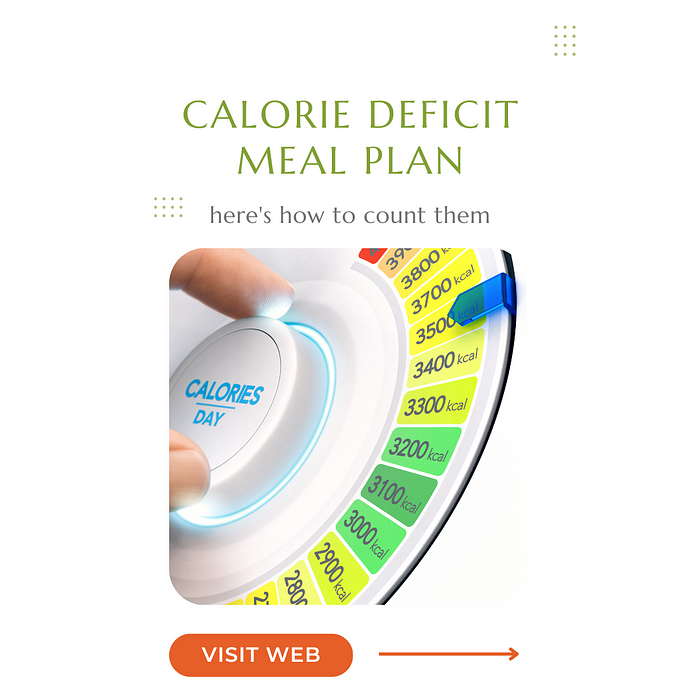A Calorie Deficit Meal Plan: Your Guide to Sustainable Weight Loss

If you’re looking to lose weight in a way that actually works long-term, you’ve probably come across the term calorie deficit. But what does it mean, and how can you create a meal plan around it without feeling deprived?
Let’s break it down into simple steps you can actually use.
What Is a Calorie Deficit?
A calorie deficit happens when you consume fewer calories than your body needs for energy. Instead of relying only on the food you eat, your body turns to stored fat to make up the difference- which leads to gradual weight loss.
Example: If your body burns 2,200 calories per day, but you eat 1,700 calories, you’re in a 500-calorie deficit. Over a week, that adds up to about 3,500 calories, or roughly 1 pound of fat lost.
This is why most experts recommend aiming for a 500–1,000 calorie daily deficit to safely lose 1–2 pounds per week.
How to Create a Calorie Deficit Meal Plan
Here are the key steps to get started:
1. Determine Your Maintenance Calories
Use an online calculator or consult a dietitian to find how many calories you need to maintain your weight. Factors include age, sex, weight, height, and activity level.
2. Set Your Deficit
Subtract 500–750 calories from your maintenance calories. This keeps your deficit sustainable (extreme cuts often backfire).
3. Prioritize Nutrient-Dense Foods
Choose whole, filling foods like:
✅ Fruits and vegetables
✅ Lean proteins (chicken, fish, beans, tofu)
✅ Whole grains (quinoa, oats, brown rice)
✅ Healthy fats (avocado, olive oil, nuts)
These provide vitamins, minerals, and fiber that support your health while keeping hunger in check.
4. Monitor Portion Sizes
Even healthy foods add up. Use portion guides (like a palm of protein, a fist of carbs) or measure servings until you get comfortable estimating.
5. Spread Meals Throughout the Day
Eating balanced meals and healthy snacks keeps blood sugar stable and helps avoid overeating later.
6. Track Your Progress
Apps like MyFitnessPal, Cronometer, or LoseIt can help you stay accountable.
7. Combine with Exercise
While diet does the heavy lifting for weight loss, exercise helps you burn extra calories, maintain muscle, and boost overall health.
8. Stay Consistent and Patient
Weight loss takes time , focus on progress, not perfection.
Here’s how a sample day might look:
🍳 Breakfast (350 cal)
- 2 boiled eggs
- 1 slice whole-grain toast
- ½ avocado
🥗 Lunch (400 cal)
- Grilled chicken salad with mixed greens, cucumber, cherry tomatoes, olive oil + lemon dressing
- 1 small sweet potato
🍎 Snack (200 cal)
- 1 apple + 2 Tbsp peanut butter
🍲 Dinner (550 cal)
- Grilled salmon or tofu
- 1 cup quinoa
- Steamed broccoli & roasted carrots
🍫 Treat (100 cal)
- A square of dark chocolate
This is just an example . Your calorie needs may vary. Adjust portion sizes based on your personal goals.
Tips for Success
- Hydrate well: Sometimes thirst feels like hunger. Aim for 2–3 liters daily.
- Meal prep: Prepping ahead keeps you from making impulsive choices.
- Be flexible: One “off day” won’t ruin your progress . Consistency matters more than perfection.
- Check in with your body: If you feel weak or excessively hungry, your deficit may be too aggressive.
Final Thoughts
A calorie deficit meal plan isn’t about restriction . It’s about balance. By focusing on nutrient-dense foods, smart portions, and gradual changes, you’ll be able to lose weight in a way that’s healthy and sustainable.
💬 Over to You! Have you ever tried a calorie deficit approach? Did it work for you, or did you find portion control and food swaps more helpful? Share your experience in the comments!
And don’t forget to follow Emmah’s Kitchen for more meal plans, recipes, and wellness tips.





